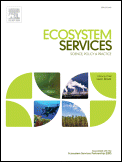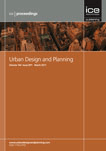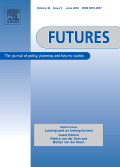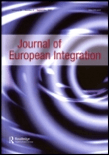
European Journal of Futures Research
Scope & Guideline
Pioneering Research in Future Studies
Introduction
Aims and Scopes
- Foresight Methodologies:
The journal emphasizes various foresight methodologies such as Delphi studies, scenario planning, and participatory approaches. These methodologies are crucial for understanding complex future scenarios and informing policy-making. - Technological Impacts and Innovations:
Research often explores the implications of emerging technologies, including artificial intelligence and smart systems, on society and governance, providing insights into the transformative potential of these innovations. - Sustainability and Resilience:
A significant focus is on sustainability transitions and resilience strategies across different sectors, including agriculture and urban development, addressing the challenges posed by climate change and resource scarcity. - Societal Futures and Youth Perspectives:
The journal addresses societal issues, particularly the aspirations and futures of youth, through explorations of cultural, political, and economic dimensions that shape their perspectives. - Interdisciplinary Approaches:
The journal promotes interdisciplinary research that combines insights from social sciences, technology studies, environmental science, and policy analysis to provide comprehensive futures research.
Trending and Emerging
- Artificial Intelligence and Ethics:
Research exploring the implications of artificial intelligence technologies, particularly concerning ethical considerations and governance, is on the rise as AI becomes increasingly integrated into various sectors. - Climate Change and Environmental Futures:
A growing body of work focuses on climate change impacts and strategies for sustainability, reflecting the urgency of addressing environmental challenges through foresight methodologies. - Societal Resilience and Adaptation:
There is an emerging interest in understanding how societies can build resilience and adapt to future uncertainties, particularly in the context of crises such as pandemics and geopolitical tensions. - Youth and Future Aspirations:
Papers examining the aspirations of youth and their role in shaping futures are gaining traction, highlighting the importance of engaging younger generations in foresight processes. - Participatory and Collaborative Foresight:
Innovative participatory approaches that involve stakeholders in the foresight process are increasingly emphasized, fostering inclusive dialogue and co-creation of future scenarios.
Declining or Waning
- Traditional Economic Forecasting:
There appears to be a decreasing emphasis on conventional economic forecasting models, as the journal increasingly prioritizes more holistic and interdisciplinary approaches to understanding futures. - Static Scenario Planning:
Static scenario planning methodologies are becoming less prominent, with a shift towards dynamic and adaptive foresight practices that account for rapid changes in technology and society. - Narrow Sectoral Studies:
Research that focuses solely on specific sectors without considering broader systemic interactions is waning. There is a growing recognition of the need for integrated approaches that address cross-sectoral challenges. - Historical Analysis of Futures Studies:
While historical perspectives have been important, there is a declining interest in purely retrospective analyses without a forward-looking component, as the journal emphasizes actionable insights for future-oriented research.
Similar Journals

Materials Futures
Catalyzing collaboration in cutting-edge materials research.Materials Futures, an esteemed journal published by IOP Publishing Ltd, stands out as a pivotal resource in the field of Materials Science, with a particular emphasis on Biomaterials. Launched in 2022 and operating under an Open Access model, the journal aims to foster accessibility and rapid dissemination of pioneering research, thus catering to the diverse needs of researchers, professionals, and students globally. With a commendable Scopus Rank of #46 out of 137 in its category, placing it in the 66th percentile, and recognized as a Q1 journal as of 2023, Materials Futures provides a vital platform for cutting-edge studies and innovations that address contemporary challenges in materials science. As the journal evolves through its convergence period from 2022 to 2024, it continues to attract high-quality submissions aimed at advancing knowledge and applications within the biomaterials sector, reflecting its commitment to contributing vital insights and fostering collaboration across disciplines. Explore Materials Futures for your research endeavors and join a community dedicated to shaping the future of materials.

Ecosystem Services
Innovating solutions for ecosystem sustainability.Ecosystem Services, published by Elsevier, is a leading interdisciplinary journal dedicated to advancing research in the field of ecosystem services and their critical role in environmental sustainability and resource management. With an impact factor underscoring its significance, this journal proudly holds a prestigious Q1 ranking in multiple categories, including Agricultural and Biological Sciences, Ecology, and Global and Planetary Change, indicating its strong influence and high-quality contributions to various scientific domains. Established in 2012 and running through to 2024, Ecosystem Services aims to publish innovative research that explores the complex interactions between ecosystem services and human well-being. This journal is particularly valuable for researchers, policymakers, and practitioners dedicated to understanding and enhancing the natural systems that underpin life on Earth. By facilitating open access to cutting-edge studies and reviews, Ecosystem Services serves as a vital resource for promoting informed decision-making and fostering sustainable development practices globally.

Geografia-Malaysian Journal of Society & Space
Championing Open Access for Global Academic EngagementGeografia-Malaysian Journal of Society & Space, published by the esteemed Universiti Kebangsaan Malaysia through its Faculty of Social Sciences & Humanities, stands as a vital platform for scholarly discourse in the fields of geography, social sciences, and spatial studies. With its ISSN 2180-2491 and E-ISSN 2682-7727, this journal emphasizes the importance of regional studies, fostering a deep understanding of societal dynamics within the Malaysian context and beyond. Although currently lacking impact factor and HIndex data, the journal is poised to contribute significantly to academic discussions, urging researchers, professionals, and students to explore spatial complexities influencing social structures. Geografia aims to publish high-quality, peer-reviewed works, focusing on innovative theoretical and empirical research that addresses contemporary issues in society and space. By promoting open access to its content, it ensures that knowledge is freely available, furthering academic engagement and collaboration in the global scholarly community.

Proceedings of the Institution of Civil Engineers-Urban Design and Planning
Exploring Interdisciplinary Approaches to Urban DesignProceedings of the Institution of Civil Engineers-Urban Design and Planning is a leading scholarly journal published by EMERALD GROUP PUBLISHING LTD, dedicated to advancing knowledge and innovation in the fields of urban design and planning. With an ISSN of 1755-0793 and E-ISSN 1755-0807, this journal serves as a vital platform for researchers, professionals, and students to disseminate impactful studies and findings. It boasts impressive rankings, including Q1 in Architecture and notable positions in Civil and Structural Engineering and Urban Studies, underscoring its significance in the academic community. The journal's scope encompasses a diverse array of topics relevant to urban environments, encouraging interdisciplinary dialogue and exploration. Although it operates under traditional access, its contributions are invaluable, reflecting the latest developments and challenges within urban planning practices. Published regularly since 2009, the Proceedings of the Institution of Civil Engineers-Urban Design and Planning is vital for those seeking to enhance their understanding of sustainable urban development and design methodologies, making it a critical resource in its fields of study.

Futures
Empowering Futures with Critical KnowledgeFutures is a renowned academic journal published by Elsevier Science Ltd, dedicated to advancing the understanding of future studies within a multidisciplinary framework. With a focus on topics spanning business and international management, development, as well as sociology and political science, Futures is ranked in the Q1 quartile for all three categories in 2023, underscoring its pivotal role in fostering innovative discussions and research. The journal, operating since 1968 and set to continue its legacy through 2024, offers a platform for scholars and practitioners to explore critical predictions and emerging trends shaping our global future. Although it is not an open-access journal, its wide circulation ensures a significant reach among academics and professionals keen on exploring the dynamics influencing societal development and strategic planning. By contributing to this esteemed publication, authors have the opportunity to enhance their visibility and engage with a vibrant community committed to transformative knowledge.

Journal of European Integration
Exploring the Dynamics of European PoliticsJournal of European Integration is a leading academic journal dedicated to the study of European politics and the dynamics of European integration. Published by Routledge Journals, part of the esteemed Taylor & Francis Ltd, this journal has established itself as a premier outlet for high-quality research, reflected in its Q1 category rankings in both Political Science and International Relations, as well as in Sociology. With a robust publication history spanning from 1977 to 2024, it offers vital insights into the complexities of political structures and societal impacts within Europe. Notably, it ranks in the 95th percentile in Political Science and International Relations and the 92nd percentile in Sociology, presenting a significant platform for scholars and practitioners alike. Although it does not currently offer Open Access options, the journal's comprehensive content serves as an essential resource for those engaged in understanding contemporary European issues and policy debates. Researchers, professionals, and students will find the Journal of European Integration to be an indispensable source of knowledge and academic discourse.

Eastern Journal of European Studies
Fostering critical scholarship in Economics, History, and beyond.Eastern Journal of European Studies is a distinguished open-access platform published by UNIV ALEXANDRU IOAN CUZA, CENTRUL STUDII EUROPENE, dedicated to advancing research and scholarship in the fields of Economics, History, Political Science, and Sociology. Since its inception in 2010, this journal has been committed to fostering a rich dialogue among scholars and practitioners, emphasizing interdisciplinary approaches to European studies. With a notable Q1 ranking in History and Q3 rankings in other social sciences categories as of 2023, the journal holds a strong position in both European and global research landscapes. As part of the Scopus indexing, it stands out with impressive percentiles, including the 90th percentile in History. By providing an open-access platform, the journal ensures that critical research is widely accessible, bridging gaps between academia and the public. It serves as an essential resource for researchers, policymakers, and students interested in exploring Europe’s complex dynamics, making significant contributions to contemporary debates and policy implications.

Mineral Economics
Advancing Sustainable Solutions for Mineral ResourcesMineral Economics is a leading interdisciplinary journal published by SPRINGER HEIDELBERG, focusing on the economic aspects of mineral resources and their sustainable use. Established in 2011, this journal aims to facilitate the exchange of research on the economics of mineral exploration, extraction, and usage, addressing global challenges such as resource scarcity, environmental impacts, and policy implications. With impressive rankings placing it in the Q2 category of Economic Geology, Economics, Econometrics, and Finance, as well as Geography and Social Sciences, it occupies a vital space in academic discourse. Notably, the journal ranks in the 90th percentile in Social Sciences and 82nd percentile in Economics, indicating its relevance and scholarly impact. The journal is available without open access restrictions, ensuring that high-quality research is accessible to a broad audience. With an evolving publication timeline slated through 2024, Mineral Economics is an essential resource for researchers, practitioners, and students committed to advancing knowledge in the economics of mineral resources.

Sustainable Futures
Shaping the discourse on sustainability and technology.Sustainable Futures, published by ELSEVIER, is a pioneering open access journal dedicated to advancing research in the fields of technology management, operational science, sociology, and political science. Established in 2019, this esteemed journal has quickly positioned itself as a vital resource within the academic community, as evidenced by its impressive 2023 rankings, including Q1 status in Sociology and Political Science. With a focus on innovative and sustainable solutions for contemporary challenges, Sustainable Futures serves as an essential platform for researchers, professionals, and students seeking to explore the intersections between technology, society, and environmental change. The journal's commitment to open access since its inception enhances its global reach and accessibility, ensuring that high-quality research is available to all stakeholders. As the academic landscape continues to evolve, Sustainable Futures is poised to be a critical voice in shaping sustainable practices and innovations from 2019 to 2024 and beyond.

European Journal of Sustainable Development
Exploring interdisciplinary pathways to ecological resilience.European Journal of Sustainable Development, published by the European Center for Sustainable Development, serves as a vital platform for disseminating research in the interdisciplinary field of sustainability. With an ISSN of 2239-5938 and an E-ISSN of 2239-6101, the journal emphasizes the importance of advancing knowledge in areas such as environmental management, sustainable development policies, and socio-economic impacts on ecological resilience. Despite its recent discontinuation in Scopus, the journal has provided valuable insights within a broad scope of categories, including Geography, Planning, Development, and Environmental Sciences. Its current rankings reflect a challenging academic landscape but also signal the journal's potential for growth and impact within these disciplines. Although not an open-access publication, the European Journal of Sustainable Development encourages researchers and scholars to contribute and engage with pressing issues of sustainability, making it an essential resource for those dedicated to fostering a more sustainable future.